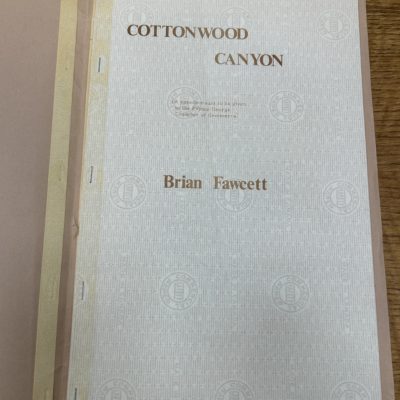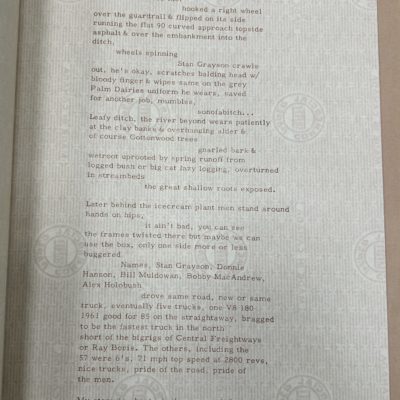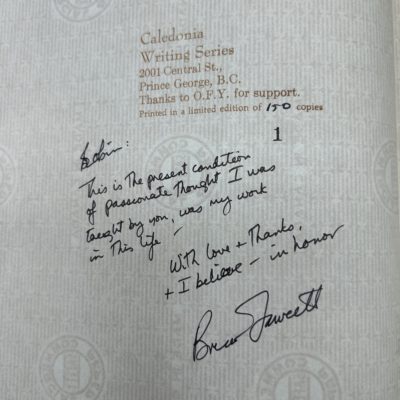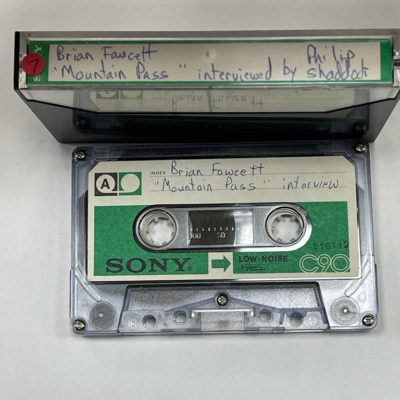“How in the hell do you get home?”: Listening to the particular in “Prince George, Finally”
April 10, 2024
Maya Schwartz
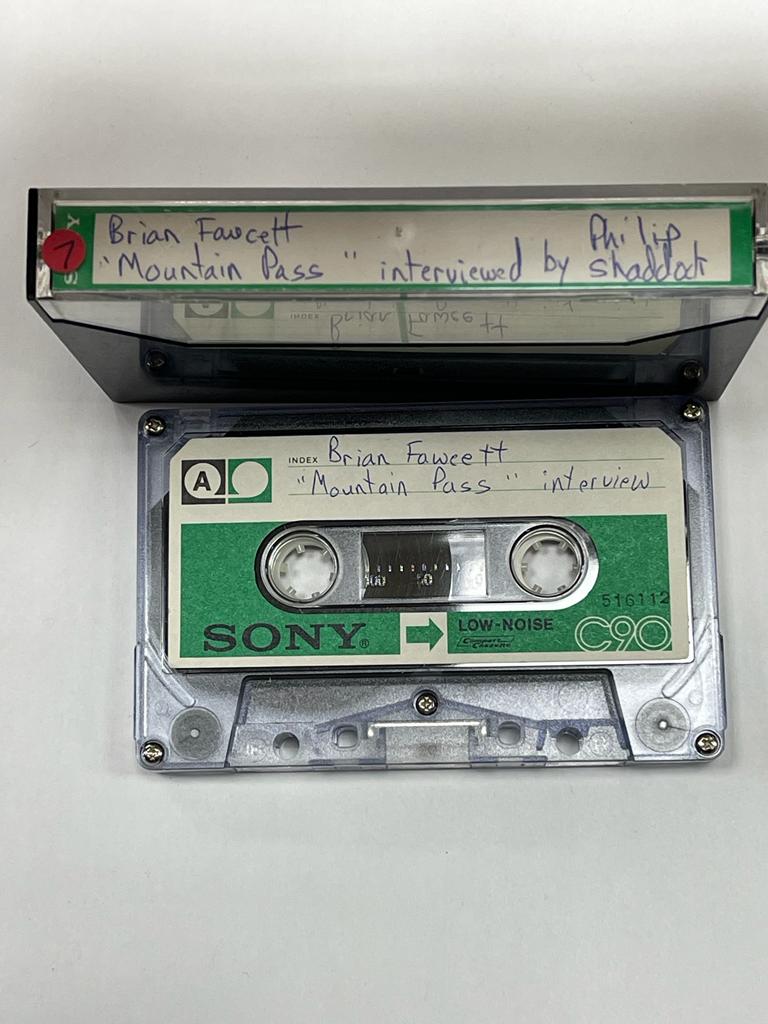

While inputting metadata as part of my RA work for Simon Fraser University’s SpokenWeb team, there was one tape that I kept coming back to. The tape is a recording of poet Brian Fawcett reading and being interviewed for the radio program Mountain Pass. After returning to this recording again and again, I decided to visit SFU’s Special Collections and Rare Books to read the manuscript of a poem featured on the recording in person. The physical poem, however, carried a sense of dissonance from the recording. Reading it challenged my understanding of what the poem was and disrupted the sense of familiarity I had developed through listening. This post is an attempt to work through some of these differences and question what I expected to find in the poem in the first place.
Mountain Pass was a 12-part series recorded for CFRO FM radio in Vancouver during the late 1970s, featuring BC poets, “their poetry, their poetics, their places” (1:15). This clip is taken from the beginning of an episode called “Prince George, Finally,” which aired in 1976. This episode, as well as others from the Mountain Pass series, are housed in various collections at Simon Fraser University, as well as other institutions across the SpokenWeb network. “Prince George, Finally” is hosted by Barry McKinnon, and is structured around the work of poet Brian Fawcett. Fawcett was born in Prince George, BC in 1944. His father was an ice cream and soft drink salesman, a fact that features heavily in his poem Cottonwood Canyon (197-), which Fawcett reads in the episode alongside another of his early works, The Opening (1974). Fawcett left Prince George for Vancouver in the 1960s, to study at Simon Fraser University. He graduated from SFU in 1969, and worked first as a city planner for the Metro Vancouver Regional District before becoming a full time writer. Fawcett died in Toronto in 2022.
The episode begins with what seems to be the theme music for the Mountain Pass series, as it also appears in other episodes of the program and is interspersed throughout “Prince George, Finally.” As the music fades, Fawcett begins reading from his work The Opening. The episode then shifts to an interview with Fawcett, led by Philip Shaddock. The interview takes place on Gabriola Island, at a log cabin “about fifty yards from the beach and ten feet from the fire,” the sounds of which can be heard throughout their conversation (2:22). Fawcett also reads from Cottonwood Canyon, after which the interview resumes and continues onto the second side of the tape. Both The Opening and Cottonwood Canyon are long poems that are in many ways about the city of Prince George and Fawcett’s attempts to both escape from and return to his hometown through his writing. However, as he tells Shaddock in the interview, “What I knew, and what I know, is not going to get me home” (9:20).
After listening to this recording, I became interested in the question of home, especially the role of home in, as McKinnon points out, poems like The Opening and Cottonwood Canyon from early in Fawcett’s career. In addition to Fawcett’s search for home, the concept of “home” is what brought me into this tape and kept me listening—my constant attention to and desire for representations of place. As a student interested in Canadian literature, questions of home and homeliness always seem to guide my research––how do representations of place, whether our own or those we see or read, inform and constitute our sense of self? In listening to this tape, I gained a sense of how a home, especially one that might push us away, plays a role in defining the work of a writer, and, perhaps, that of a researcher. From first listening to the tape to then going to SFU’s Special Collections and Rare Books to read Cottonwood Canyon in print form, I was left with the impression that there is also a danger and violence inherent in this act of return. Fawcett and Shaddock refer to Odysseus’s return to Ithaca, where he finds a house full of suitors and in general disarray. I was left wondering how we might relate this “disarray” upon returning home to our own work in the archives and in writing about archives.
The focus of the first section of the interview, from which the clip is taken, is on Fawcett’s use of “the particular”: his incorporation of images from and references to the world around him, projecting a kind of immediacy onto his work. “If I have any unusual talent as a writer,” he says, “that’s it, right there” (7:35). He talks about having kept a journal for six years, which led him to the feeling that his “personal reality had two separate and mutually exclusive lines” (3:43). So he decided not to buy journals anymore. The result, as I understand it, was that the personal was then able to infuse his work without mediation. Shaddock asks Fawcett if this infusion was a kind of exorcism, to which Fawcett agrees, and says that it also became a skill: “I learned how to be absolutely personal without the slightest embarrassment” (4:27). Shaddock also suggests that writing the personal is a mode of self discovery, which Fawcett corrects as really being a discovery of the world, and that he was a self within the world. There is a moment where Fawcett says, “I used to have a feeling when I walked around that the ground was soft beneath my feet” (6:30). Finding himself in the world through the use of the particular has, in opposition to this comfortability, opened him up to the “risk of being a human being” (5:29).
The particular finds its way into Fawcett’s reading of his poetry work especially through references to place. The risks to this method are also clear. Reading from The Opening at the beginning of the episode, we hear Fawcett say, “I’m in downtown Vancouver, the Sylvia’s closed I’m a little drunk and I stumble. The seawater fills one of my rust coloured shoes it was rotting in heat and now its raining over the surf” (1:00). The particular exists in the ways that Fawcett positions himself in Vancouver, naming the Sylvia Hotel and his experience of standing on the beach at English Bay. However, in the interview, he goes on to describe the significance of these references beyond rhetorical strategy or positioning. He says, “the sea is not a symbolic sea, it’s the real sea. And you might just walk into it” (6:07). For Fawcett, writing the particular means there is a stake in what is being written; it considers the inherent risks of the world and our entrenchment in them.
In the second poem he reads, Cottonwood Canyon, Fawcett attends to the particularities of his hometown of Prince George, BC. Fawcett describes his failed attempts to write poems about Prince George in the past: “One’s first instinct, I think, as a very young man, is to transcend one’s own beginnings. And I tried that. I tried to turn Prince George into a poem––turned out to be a pretty lousy poem” (8:38). Trying to write about Prince George abstractly didn’t work for Fawcett, because as he says, “where I was in the construct was not at all clear” (8:40). He was trying to “constantly elude the violence, the roughness and the lack of value,” which he saw as the position he’d been subject to as a child (8:48). He believed that there was somewhere else, somewhere better. Fawcett states that the trajectory of his career as a writer has largely been about trying to find his way back to Prince George, out of the abstraction. “How in the hell do you get home?” (9:39) he asks. Fawcett and Shaddock relate this attempt at homecoming to The Odyssey, with The Opening being the journey, including Odysseus’s near drowning and being tossed around in the surf. Cottonwood Canyon, on the other hand, is the return to Ithaca, but finding it not as he thought he left it.
The subtitle of Cottonwood Canyon is “a speech meant to be given to the Prince George Chamber of Commerce.” In the recording, McKinnon describes the poem as being about the ice cream and soda business that Fawcett’s father owned until it was bought out by a conglomerate, telling a larger story about the economy of the city and industrial capitalism. I heard the poem as a critique of ambitions often surrounding resource economy towns; as Fawcett writes in Cottonwood Canyon, men came to the city “to escape the hungers of the big/cities & came with a fierceness to work &/make money/women to raise children.” After listening to it, I went to go read the poem myself, in hard copy in the SFU library. SFU Special Collections and Rare Books had two copies of Cottonwood Canyon in the Robin Blaser Fonds. Neither were bound books in the way I imagined them to be, but instead were made up of long sheets of stamped commercial paper, the poem itself type-written in brown ink down the middle of the page, and stapled between a cover of brown kraft-like paper. One copy had a handwritten dedication to Blaser, but neither included a date of publication. Flipping awkwardly through the manuscript, I first noticed the section breaks and indentations that you can’t hear in the recording. As I began to read closer, I realized just how many sections of the poem had been cut out due to the length of the program, a practical note that McKinnon mentions at the beginning of the episode. The sections that had been cut were themselves striking because of the violence of the images they presented. From the female gendering of the gear shift (“punch the clutch & let her out of gear & then punch her again & into gear”) to the recounting of a car going off the road with both driver and passenger drunk, the poem is, evidently, about much more than “whether or not it is possible to take the south approach to the Cottonwood bridge at 60 mph & so make it up to the north side of the river canyon without having to gear down all the way” (Fawcett). Or rather, it is about everything that that goal encompasses.
Throughout the nine page poem, the violence of the scenes are interlaced with Fawcett’s rolling syntactical descriptions of landscape, the rhythm with which he reads them being part of what drew me to the poem in the first place. This juxtaposition occurs, for instance, when he writes:
will you tell me that the object
of human desire is a shitkicking
in which
the violence is imagined?
Okay, But
you must explain the root of imagination.
In the lowlands it is the swift green
growth of the Cottonwoods. (Fawcett)
The violence of a place is inextricably linked to how we imagine it. Moreover, Fawcett says in the interview that writing Cottonwood Canyon allowed him to finally leave Prince George, both psychologically and artistically. His son Max Fawcett, however, has stated that “he never really left [Prince George] in his heart and in his mind” (Dalgleish). How do we account for this discrepancy? In another interview with Linda Morra, Fawcett says, “you can’t know anything unless you understand the place you know it in. My place of first knowledge––of almost everything––was the city in which I grew up” (Morra 2). If this is the case, can we ever really escape the places we come from? In a research context, how can an effort to return to these places help us, and what dangers do they pose?
As previously mentioned, I was drawn to this tape because the sounds it carried were immediately familiar––the music, the crackling of a fire, names of places in Vancouver like the Sylvia Hotel, as well as small towns of the interior like Burns Lake. I was also drawn in physically. The low and inconsistent volume of the tape meant I had to often press my ear directly against my computer to hear the muffled conversation, trying carefully to decipher each word. But as I went back over the poem in the archive, I was struck by the brutality that I had somehow missed. I wasn’t exactly surprised by the images of sexual violence, of alcohol abuse and the general “bullshit laid down between men” (Fawcett), perhaps due to a mix of both my own assumptions of and experiences with industry and isolation, both of which are at the forefront of Cottonwood Canyon. However, they made me question why I had chased this poem in the first place. Why had I sought out these representations? Perhaps I was uncomfortable because the poem made me question what I thought I knew about places I took to be familiar, like Prince George, where I work during the summer as a tree planter, as well as my own hometown of Winnipeg that like Fawcett, I consider to be “my place of first knowledge.” It made me doubt whether it was possible to return to either place in the ways I imagined.
The disarray in the content of the poem also indirectly reflects my experience of returning to the physical poem in the archive and working with archives in general. I first listened to the recording to gather metadata with no idea what would be on the tape until I hit play, an experience that I always find a bit disorienting. However, with “Prince George, Finally,” I felt comforted and intrigued by the recording. I wanted to keep listening even after I’d retrieved all the information I needed. Then, visiting the archive almost a year later and physically handling the long commercial pages of Cottonwood Canyon, I found something other, or more than, the poem I thought I’d heard. These contradictions made me wonder if the reckoning––between what exists in the archive versus what we hope to find there, or, for Fawcett, between a place as it actually is and the way we imagine it––can be, in addition to a sometimes destructive experience, also a fertile one. To affect change, Fawcett says to Shaddock, “you propose the violence of this world, not the violence of the next world or the violence of change––we have no idea how the change will occur” (34:41). The search for home, therefore, can be a way of proposing this violence, of sorting through the complexity of the world and understanding the places that form our imagination.
